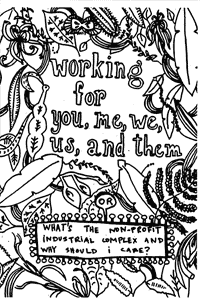What's the Non-Profit Industrial Complex and why should I care?

- Added to Catalog: 2015
- Print Version: Download
This introductory zine explains the “non-profit industrial complex” and how it functions to limit radical movements. It draws heavily on the book “The Revolution Will Not Be Funded: Beyond the Non-Profit Industrial Complex” and presents examples of this works on an international and national level. This particular zine isn’t the most nuanced argument, but it’s a helpful introduction to the topic and asks important questions about the institutionalization of social struggles.
Excerpt
The non-profit industrial complex (or the NPIC) is a system of relationships between, the State (or local and federal governments), the owning classes, foundations, and non-profit/NGO social service & social justice organizations that results in the surveillance, control, derailment, and everyday management of political movements. The state uses non-profits to: Monitor and control social justice movements; Divert public monies into private hands through foundations; Manage and control dissent in order to make the world safe for capitalism; Redirect activist energies into career-based modes of organizing instead of mass-based organizing capable of actually transforming society; Allow corporations to mask their exploitative and colonial work practices through "philanthropic" work; Encourage social movements to model themselves after capitalist structures rather than to challenge them.
Download
Zines are in PDF format. Choose imposed for printing and reading for reading on your device.
The files are are also mirrored on Archive.org, a service that does not log IP addresses. You can download the print version or from Archive.org.
Share on Social Media
- Share on Mastodon
- Share on Twitter
- Share on Facebook
- Share on Tumblr
- Share on Reddit
- Share on Telegram
- Share on WhatsApp
These links are not an endorsement of social media. They are provided for convenience and to help foster the spread of anarchist ideas.